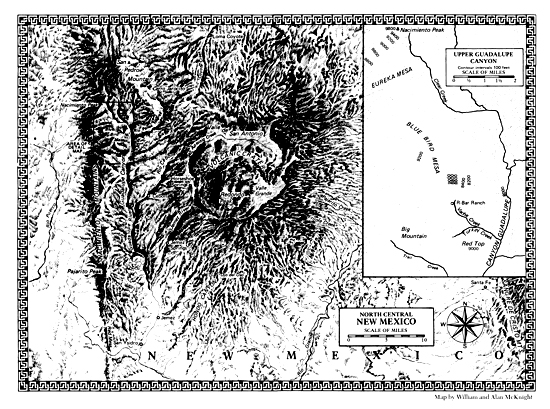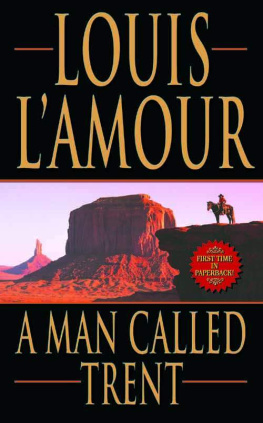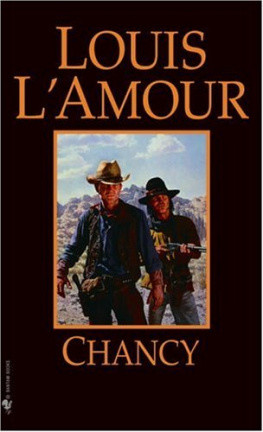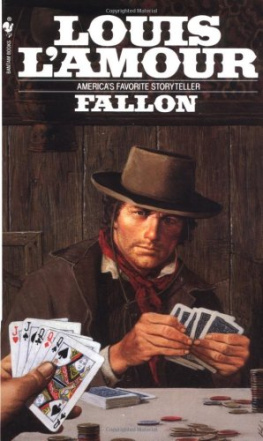Louis LAmour - Radigan: A Novel
Here you can read online Louis LAmour - Radigan: A Novel full text of the book (entire story) in english for free. Download pdf and epub, get meaning, cover and reviews about this ebook. year: 2004, publisher: Bantam, genre: Detective and thriller. Description of the work, (preface) as well as reviews are available. Best literature library LitArk.com created for fans of good reading and offers a wide selection of genres:
Romance novel
Science fiction
Adventure
Detective
Science
History
Home and family
Prose
Art
Politics
Computer
Non-fiction
Religion
Business
Children
Humor
Choose a favorite category and find really read worthwhile books. Enjoy immersion in the world of imagination, feel the emotions of the characters or learn something new for yourself, make an fascinating discovery.

- Book:Radigan: A Novel
- Author:
- Publisher:Bantam
- Genre:
- Year:2004
- Rating:3 / 5
- Favourites:Add to favourites
- Your mark:
- 60
- 1
- 2
- 3
- 4
- 5
Radigan: A Novel: summary, description and annotation
We offer to read an annotation, description, summary or preface (depends on what the author of the book "Radigan: A Novel" wrote himself). If you haven't found the necessary information about the book — write in the comments, we will try to find it.
Radigan: A Novel — read online for free the complete book (whole text) full work
Below is the text of the book, divided by pages. System saving the place of the last page read, allows you to conveniently read the book "Radigan: A Novel" online for free, without having to search again every time where you left off. Put a bookmark, and you can go to the page where you finished reading at any time.
Font size:
Interval:
Bookmark:


Contents

G ET R ADIGAN!
A RIFLE FIRED from the house and Radigan dove for the brush, falling on his hands as a second bullet clipped brush ahead of him. He rolled over, catching a quick glimpse of Angelina Foley herself standing near the porch, working the lever on the Winchester.
His roll had put Radigan on hands and feet and he dove forward in a plunging run that crashed him into the brush. Dodging quickly to change his line of travel, he reached the black. The horse was frightened and it was a wild minute before he could get a foot into stirrup and swing to the saddle.
Behind him another rifle shot cut the brush and he heard running feet. Then the black was running, heading toward the San Ysidro Trail, yet an instant later, when the horse swung up on a slight rise, he saw a dozen horsemen fanned out between him and the trail, coming fast.
Chapter 1
T HE DRIVING RAIN drew a sullen, metallic curtain across the fading afternoon, and beneath his horses hoofs the earth was soggy with this rain and that of the rains that had gone before. Hunching his big shoulders under the slicker, Tom Radigan was thinking of the warm cabin and the hot coffee that awaited him when he glimpsed the trail across the meadow.
A walking man will kick the grass down in the direction of travel, but a horse with the swinging movements of its hoofs will knock the grass down so it points in the direction from which it has come. What Tom Radigan saw was the trail of a ridden horse that had come down from the lonely hills to the southwest and headed into even lonelier hills beyond his ranch house.
Squinting from under his dripping hat brim in the direction the trail pointed he saw nothingonly a trail that crossed the knee-high grass of the meadow and disappeared into the hills beyond.
Now what in thunderation, he said aloud, would anybody want back in there on a day like this?
Or on any other day, for that matter.
In a world in which most things have a reason, Radigan was disturbed. Northern New Mexico in the 1870s was not a place where men rode for pleasure, and especially not in a driving rain on the heels of several days of driving rain; nor was there anywhere to go in that direction other than the bluff back of the ranch.
Nor was it a riderless horse, for a wandering horse does not move in a straight line nor at the pace this horse had traveled.
Ordinarily, Radigan would not have seen the trail for this was not a route he usually chose, but for the past months he had been moving stock into a remote area known locally as the Valle de San Antonio, a well-watered valley nearly twenty miles from his home ranch.
Three days ago he had driven a dozen head of cattle to augment the herd already there, and had remained long enough to trap and kill two mountain lions who had begun poaching on his herdand he had also killed a cinnamon bear. There were now three hundred and some head of cattle in the upper valley.
Returning, he found this trail, which could scarcely be more than an hour old.
Whoever had made the trail had chosen a route that could not have been accidental; no casual rider would have come that way, but only someone who did not wish to be seen. There were easier ways and more direct routes.
Tom Radigans R-Bar outfit was remote, hidden back in the hills far from any accepted route of travel. He worked his range alone but for one hand, a half-breed Delaware who had once scouted for the Army and was known as John Child.
Nothing about that trail or the direction of travel made sense, and Tom Radigan was a man who was disturbed by the illogical.
Coming out of the draw where the meadow lay he looked across the fairly wide sweep of Canyon Guadalupe and over the gradually rising bench beyond it toward the ranch. During a momentary lull in the rain the ranch buildings and the trees around them were plainly visible, for the ranch was almost three miles away but a thousand feet higher than his present position.
Uneasily, he studied the ranch, and then bit by bit he surveyed the intervening country. The route of the strange rider led across the hills to the north and west, but mostly to the west.
Nothing in his life gave him reason for a sense of security, nor had he ever been a reckless man, nor one given to taking unnecessary chances. He had, even as a boy, often been accused by the more foolhardy of being afraid to take chances, and the very idea of taking a risk that was not demanded by circumstances was repugnant to him. Yet much of his life had been lived where caution was the price of survival, and being the man he was, he had survived. He did not take chances, but had helped to bury men who did.
So now he took none. He rode slowly, utilizing every bit of terrain that offered cover or concealment, and avoiding his usual route by swinging south of a rocky promontory by a way that ran parallel to the trail.
The problem of the strange rider was disturbing, yet approaching the ranch with care he saw no one. A thin trail of smoke lifted from the chimney, but there was no other movement, and there should have been. Riding in from behind the stables and corrals, Radigan drew up and surveyed the situation with care.
Behind the ranch house which faced him across the clearing, the mesa towered five hundred feet above the low buildings and their surrounding trees. At the base of the mesa Tom Radigan had found that most precious of ranching commoditieswater. And he had found plenty of it.
A dozen springs flowed from cracks and caves in the lower wall of the mesa to gather in a pool at its base, and from the pool a small stream trickled off down the mountain to lose itself in Vache Creek some distance from the ranch. Before the water left his own immediate ranch yard Radigan turned it aside to irrigate a small home garden as well as several acres of alfalfa, the first planted anywhere around of which he knew. Leaving the garden and the alfalfa the remaining water trickled into a series of small pools where his stock came to water.
A wanderer and a prowler of the back country, Radigan had come upon an ancient Indian trail that led him to this place. There were no signs of life but wild animals, and a few arrowheads of a kind used by no Indians of the time. There had been no tracks, no evidence of any human visit, so here Tom Radigan built his cabin and corrals. Later, he drove in a small herd of cattle, forty head of cows and two good bulls. He brought with him four mules and three saddle ponies, a small remuda which he augmented by capturing wild horses in the breaks of the mountains to the north where all was utter wilderness for many miles.
It was knowledge of that wilderness which now made him cautious. A man on the dodge running to one of the three or four outlaw settlements reported to exist up there would not have chosen this route, either. Nothing about that rider made any kind of senseunless he had an enemy of whom he was not aware.
Tom Radigan was a tall, quiet man who rarely smiled except around the eyes, and who talked little but listened well. His was a disconcertingly direct gaze in times of trouble, and men who faced him at such times found that gaze unnerving and upsetting to sudden action. At least such reports had come from three mentwo others had been in no condition to volunteer any information.
Next pageFont size:
Interval:
Bookmark:
Similar books «Radigan: A Novel»
Look at similar books to Radigan: A Novel. We have selected literature similar in name and meaning in the hope of providing readers with more options to find new, interesting, not yet read works.
Discussion, reviews of the book Radigan: A Novel and just readers' own opinions. Leave your comments, write what you think about the work, its meaning or the main characters. Specify what exactly you liked and what you didn't like, and why you think so.






